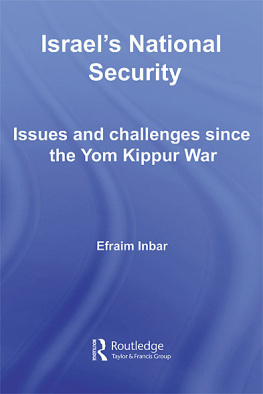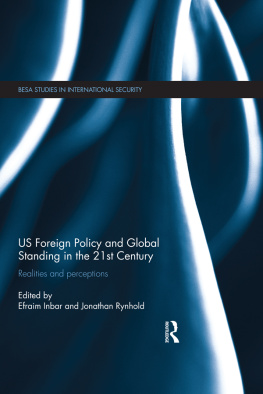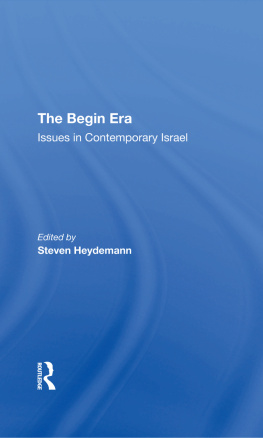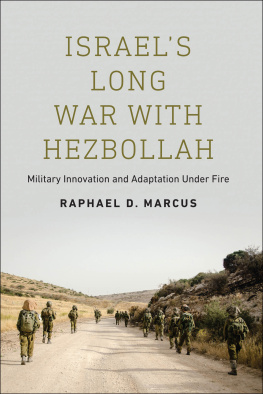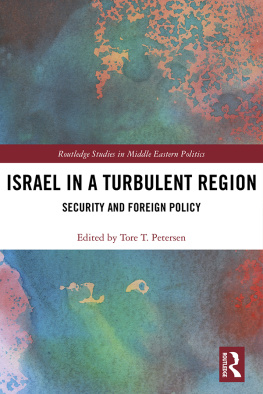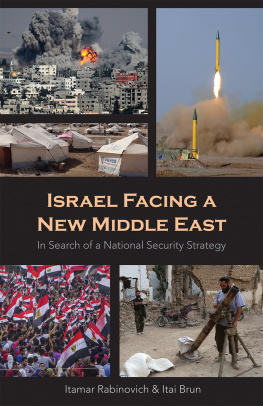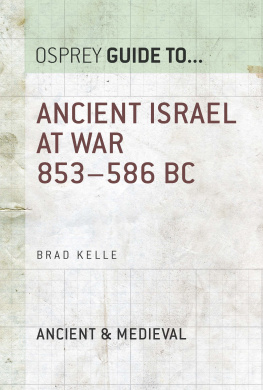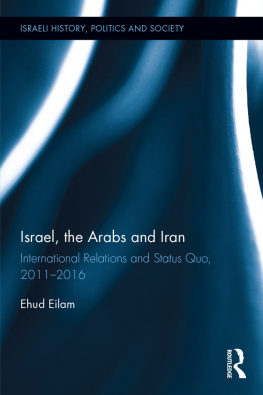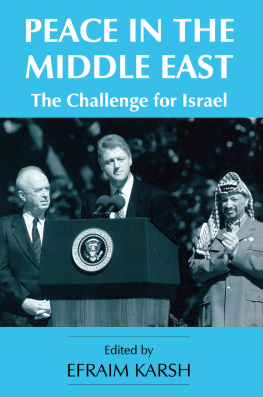Israel's Strategic Agenda
The first part of this book examines political and economic factors in the global strategic environment including the approach of US and EU foreign policies towards Israel, global trends, the energy sector, Middle East development and their implications for Israel.
The second part of the book focuses on Israel's strategic agenda as reflected in its military force design and doctrine, the dilemmas the country has faced in the course of fighting its wars of attrition, the relations between military and civil sectors in Israel, the struggle against Israel on the part of non-governmental organizations, Israel's main security challenges and national grand strategy.
This book was previously published as a special issue of Israel Affairs.
Efraim Inbar is a Professor of Political Studies at Bar-Ilan University and Director of the BESA Center for Strategic Studies.
First published 2007 by Routledge
2 Park Square, Milton Park, Abingdon, Oxfordshire OX14 4RN
Simultaneously published in the USA and Canada
by Routledge
270 Madison Avenue, New York, NY 10016
Routledge is an imprint of the Taylor & Francis Group, an informa business
Transferred to Digital Printing 2009
2007 Efraim Inbar
Typeset in Sabon 10.5/12pt by the Alden Group, Oxfordshire
All rights reserved. No part of this book may be reprinted or reproduced or utilised in any form or by any electronic, mechanical, or other means, now known or hereafter invented, including photocopying and recording, or in any information storage or retrieval system, without permission in writing from the publishers.
British Library Cataloguing in Publication Data
A catalogue record for this book is available from the British Library
Library of Congress Cataloging in Publication Data A catalog record for this book has been requested
ISBN10: 0-415-41360-5 (hbk)
ISBN10: 0-415-49519-9 (pbk)
ISBN13: 978-0-415-41360-2 (hbk)
ISBN13: 978-0-415-49519-6 (pbk)
EFRAIM INBAR
The mandate of the Begin-Sadat (BESA) Center for Strategic Studies at Bar-Ilan University is to encourage research and fresh thinking on Israel's national security problems. Once a year, the BESA Center convenes an international gathering of scholars and policy-makers to discuss one issue relevant to regional security. The conference organised by the BESA Center in June 2005 was devoted to Israel's Strategic Agenda and this volume is the updated product of the papers presented.
Israel is a small state whose fortunes are largely determined by external factors. The initial impact of the end of the Cold War on Israel's situation was positive: Israel's international status was significantly improved and its regional acceptance by a reluctant Arab world became more widespread. While the danger of a large-scale conventional war has receded, Israel still faces significant security challenges from regional forces that are ideologically still determined to destroy the Jewish state. Hizballah in Lebanon and Hamas in the Palestinian territories are examples of organisations engaged in low-intensity conflict. At the other end of the ladder of violence, the aspirations of the extremely hostile Islamic Republic of Iran seem to constitute an existential threat. This volume is comprised of twelve articles examining various issues affecting Israel's national security challenges.
The first part of this collection includes five articles analysing different aspects of Israel's strategic envelope. They analyse Israel's global environment in the Twenty-first Century, pondering its influence on Israel's national security situation. The components discussed are the United States (US), the European Union, China, the Middle East and the political economy of energy. The general tenor of these contributions is that the Israeli strategic environment will continue to be favourable.
The opening article, by Steven David, focuses on the US, the hegemonic power in the post-Cold War era and its policy towards the Middle East. David argues that with the relative simplicity of the Cold War gone, few would hazard a guess as to the course of American diplomacy in the years to come, except to recognise that the Middle East will remain central to American interests. The key threats to vital American interests: terrorism, the spread of weapons of mass destruction and access to oil, are all rooted in the Middle East. America's current involvement in Iraq, and its continuing concern for the security of Israel, reinforce this region's paramount importance. According to David, American foreign policy towards the Middle East has gradually undergone a subtle, but fundamental, change. The key threats to American interests in the world do not now stem from the foreign policies of Middle Eastern states, but originate from internal developments, many of which are beyond the control of their governments. The Bush Administration has responded to these changes by adopting a foreign policy that is primarily concerned with what happens within countries. It is especially committed to promoting the spread of democracy, even if doing so brings instability in its wake. David points out that the basic thrust of the Bush approach to the Middle East benefits Israel a true democracy in the region. In contrast, a Palestine that fails to become a liberal democracy, that is unable to impose order even in Gaza, and that remains corrupt and unaccountable to its people, will not be seen by the US as a responsible partner for peace. Instead, the US can be expected to reinforce its ties with Israel and act with understanding and patience if Jerusalem is reluctant to proceed with additional territorial concessions.
The trajectory of other events throughout the world will also serve, in David's opinion, to reinforce the American-Israeli bond. Iran's efforts to obtain nuclear weapons will drive the US even closer to Israel. There is nothing like a common threat to cement an alliance, and the threat from Iran to both Israel and the US increases dramatically as Tehran gets closer to acquiring nuclear arms. Aside from Iran, America's war with terrorism will further deepen American-Israeli ties. Israel has much to teach America about Islamic radicalism, counter insurgency, anti-terrorism and the ways of the Middle East. In the wake of 9/11 and the American invasion of Iraq, the Bush Administration is painfully, if slowly, acknowledging that it has much to learn. As the US pursues its war on terror, Israel is a useful ally, whose experience of being on the front lines against Islamic extremism is matched by no other state. Similarly, the rise of China, that has yet to embrace democracy, can also be expected to drive the US closer to Israel. In a threatening world, the US will continue to recognise that American-Israeli shared values, and the two states' common strategic vision, will overcome passing conflicts of interest.
In the second article, Rory Miller looks at how the European Union (EU) treats Israel. In the period following the collapse of the Oslo peace process and the outbreak of the Palestinian terror campaign in late 2000, until the death of the longstanding Palestinian leader Yasser Arafat in November 2004, relations between the EU and Israel reached an all-time low. Miller's article examines how bilateral EU-Israeli relations reached such a nadir, and whether Arafat's death and Israel's unilateral withdrawal from the Gaza Strip in August 2005 have provided an opportunity for improving the relationship. Miller also assesses the reasons why the bilateral economic relationship between Israel and the EU member states has shown great resilience, and has even thrived, despite significant political differences. Miller concludes that while Israel cannot moderate the EU's political position, it is also true that the EU is unable to exert political influence, unless it can earn the confidence of Israel. In addition, the EU and Israel are bound together not only by trade interests, but also by shared geo-strategic concerns due to their geographic proximity and their mutual desire for stability in the wider Middle East. Most notably, both the EU and Israel are opposed to the Islamic revolutionary regime in Iran gaining a nuclear weapon capability. Moreover, the EU's assumption of a lead role on the Iranian issue, one that is at the top of the Israeli national security agenda, highlights just how intertwined Israeli and European interests are. Finally, Miller advises the EU and Israel to embrace the opportunity provided by the death of Arafat and the Gaza disengagement to improve bilateral political relations.


